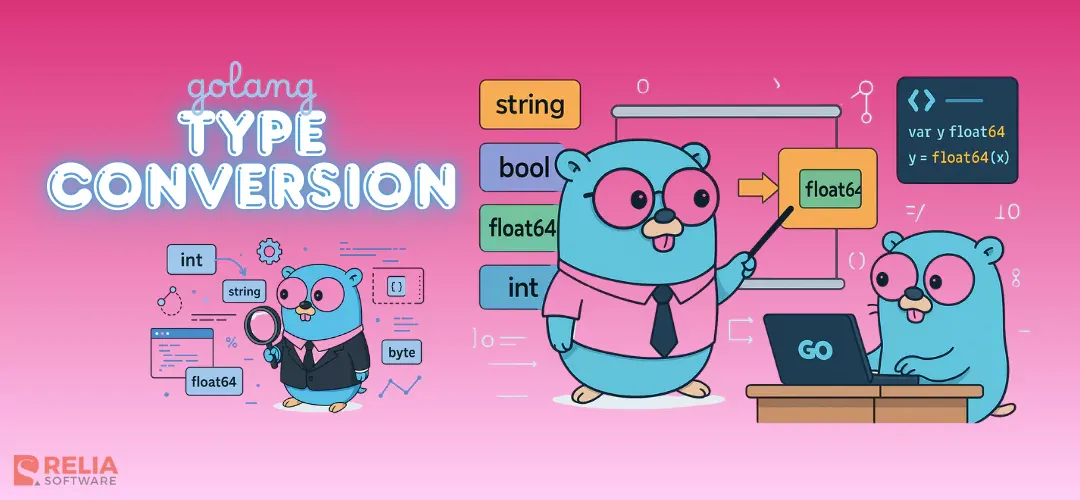In many cases, you will need to convert data types. Professionals may find Golang's type conversion notion easy to grasp, but beginners may find it difficult to grasp anything at first. The fact that Golang has a distinct approach to type conversion is probably to blame for this. In this post, we will talk about type casting, also called a conversion, in the Go programming language.
>> Read more about Golang:
- Hands-On Implementation for Dependency Injection in Go
- Detailed Code Examples of Dependency Inversion Principle in Go
What is Type Conversion?
Type conversion, or type casting, is the process of converting a value from one data type to another. In Go, a statically-typed language, explicit type conversion is required to ensure compatibility between different data types. It involves changing the type of a variable to another explicitly, providing precision and avoiding unintended behavior.
Introduction to Go Data Types
Go, a statically-typed language, categorizes data into various types, each with unique characteristics. The fundamental types include integers (int), floating-point numbers (float), strings, booleans, and more. To make informed decisions during type conversion, let's delve into a detailed comparison of integer and float types:
Integer Types
| Type | Size (bits) | Minimum Value | Maximum Value |
|---|---|---|---|
| int8 | 8 | -128 | 127 |
| int16 | 16 | -32768 | 32767 |
| int32 | 32 | -2147483648 | 2147483647 |
| int64 | 64 | -9223372036854775808 | 9223372036854775807 |
| uint8 | 8 | 0 | 255 |
| uint16 | 16 | 0 | 65535 |
| uint32 | 32 | 0 | 4294967295 |
| uint64 | 64 | 0 | 18446744073709551615 |
Floating-Point Types
| Type | Size (bits) | Smallest Non-zero Positive Value | Largest Finite Value |
|---|---|---|---|
| float32 | 32 | ±1.401298464324817e-45 | ±3.4028234663852886e+38 |
| float64 | 64 | ±4.9406564584124654e-324 | ±1.7976931348623157e+308 |
Understanding the nuances of each type is essential for making effective decisions during type conversion.
What is the Need for Type Conversion in Golang?
Why Go Requires Type Conversion?
Go statically-typed nature ensures compile-time safety and clarity. Explicit type conversion is necessary to avoid ambiguity and enhance code readability. The need for it is rooted in Go commitment to producing robust and predictable programs.
Go vs. Other Languages
Go insistence on explicit typing distinguishes it from dynamically-typed languages like JavaScript. While dynamic typing allows for more flexibility, Golang's static typing catches type-related errors at compile-time, enhancing robustness.
Scenarios Demanding Type Conversion
Arithmetic Operations:
When performing arithmetic operations involving different numeric types, explicit type conversion is necessary to avoid unexpected results or loss of precision.
var a int = 42
var b float64 = 3.14
result := float64(a) * b // Explicit conversion for accurate arithmeticInterface Implementation:
Interfaces in Go demand explicit type conversion when implementing methods for custom types, allowing them to satisfy the interface.
type MyInterface interface {
PerformAction()
}
type MyType int
func (m MyType) PerformAction() {
// Implementation for MyType
}
var obj MyInterface = MyType(42) // Explicit conversion to satisfy the interface>> Read more:
- Comprehending Arrays and Slices in Go Programming Language
- Cloud Success Blueprint: Why Go Is A Perfect Match?
Types of Type Conversion in Golang
Implicit Type Conversion
Implicit type conversion, also known as type coercion, occurs automatically when the compiler handles conversions between compatible types. However, Go emphasizes explicitness, and implicit conversion is limited. For instance, there's automatic conversion between numeric types when there's no loss of precision.
var a int = 42
var b float64 = a // Implicit conversion from int to float64Explicit Type Conversion
Explicit type conversion involves the programmer explicitly specifying the desired type. It provides control over how conversions are performed and is a key feature of Golang.
var intValue int = 42
var floatValue float64 = float64(intValue) // Explicit conversion from int to float64Scenarios Requiring To Convert Data Types
Type conversion is essential in various scenarios, playing a crucial role in ensuring the smooth operation of Go programs. Here are some key situations where type conversion is necessary:
- Assigning Values: When you need to assign a value of one type to a variable of a different type, explicit type conversion is used to maintain compatibility.
- Function Calls: In situations where a function expects arguments of a specific type, type conversion is employed to ensure that the provided arguments match the expected types.
- Arithmetic Operations: Type conversion becomes crucial when performing arithmetic operations involving different numeric types. This is done to guarantee precision and prevent unintended behavior in calculations.
- Database Interaction: When interacting with databases, it's common to encounter different data types. Type conversion is necessary to harmonize the types and maintain consistency between the data stored in the database and the data handled in the Go program.
- JSON Encoding/Decoding: When working with JSON data, which is a common format for data exchange, type conversion is required. It allows for the transformation of Go data structures into a JSON format for storage or transmission and vice versa.
- Interface Type Conversion: Go interfaces often require type conversion for seamless integration. This involves converting custom types to interface types, enabling objects of those types to satisfy the interface's expectations.
Sample Code
Assigning Values
var intValue int = 42
var stringValue string = strconv.Itoa(intValue) // Explicit conversion from int to string
Function Calls
func processFloat(value float64) {
// Processing float value
}
var intValue int = 42
processFloat(float64(intValue)) // Explicit conversion for function callArithmetic Operations
var a int = 42
var b float64 = 3.14
result := float64(a) * b // Explicit conversion for accurate arithmeticDatabase Interaction
var quantity int = 10
var price float64 = 24.99
// Database query expecting quantity as float64
db.Query("INSERT INTO products (quantity, price) VALUES (?, ?)", float64(quantity), price)JSON Encoding/Decoding
package main
import (
"encoding/json"
"fmt"
)
// Define a struct representing a person
type Person struct {
Name string `json:"name"`
Age int `json:"age"`
}
func main() {
// Create an instance of the Person struct
p := Person{
Name: "John Doe",
Age: 30,
}
// JSON encoding: Convert struct to JSON
jsonData, err := json.Marshal(p)
if err != nil {
fmt.Println("Error encoding JSON:", err)
return
}
fmt.Println("JSON Encoding:")
fmt.Println(string(jsonData))
// JSON decoding: Convert JSON to struct
var decodedPerson Person
err = json.Unmarshal(jsonData, &decodedPerson)
if err != nil {
fmt.Println("Error decoding JSON:", err)
return
}
fmt.Println("\nJSON Decoding:")
fmt.Printf("Name: %s\nAge: %d\n", decodedPerson.Name, decodedPerson.Age)
}Type Conversion in Interface
package main
import "fmt"
// Define an interface with a method
type Shape interface {
Area() float64
}
// Define a struct representing a rectangle
type Rectangle struct {
Width float64
Height float64
}
// Implement the Area method for Rectangle
func (r Rectangle) Area() float64 {
return r.Width * r.Height
}
// Define a struct representing a circle
type Circle struct {
Radius float64
}
// Implement the Area method for Circle
func (c Circle) Area() float64 {
return 3.14 * c.Radius * c.Radius
}
func main() {
// Create instances of Rectangle and Circle
rect := Rectangle{Width: 5, Height: 3}
circle := Circle{Radius: 2}
// Use the Area method through the Shape interface
shapes := []Shape{rect, circle}
fmt.Println("Calculating Areas:")
for _, shape := range shapes {
area := shape.Area()
fmt.Printf("Area: %f\n", area)
}
}Compile Error on Implicit Type Conversion
While Golang allows some implicit type conversions, there are cases where it results in a compile-time error. This emphasizes Golang commitment to type safety.
var x int = 42
var y string = x // Compile-time error: cannot use x (type int) as type string in assignmentThis compile-time error serves as a safeguard, preventing unintended conversions and maintaining the integrity of the codebase.
Handling compile errors due to implicit type conversion in Go involves recognizing the potential pitfalls and addressing them by explicitly converting types where necessary. Here are some strategies to handle compile errors related to implicit type conversion:
1. Review Variable Assignments
- Carefully review all variable assignments, especially when assigning values of one type to a variable of another type.
- Explicitly convert the values using the appropriate type conversion syntax.
var x int = 42
var y string = strconv.Itoa(x) // Explicit conversion from int to string2. Check Function Signatures
- Examine function signatures, ensuring that arguments provided match the expected types.
- Use explicit type conversion when calling functions with arguments of different types.
func processFloat(value float64) {
// Processing float value
}
var intValue int = 42
processFloat(float64(intValue)) // Explicit conversion for function call3. Be Explicit in Arithmetic Operations
When performing arithmetic operations involving different numeric types, be explicit in type conversion to avoid unintended behavior.
var a int = 42
var b float64 = 3.14
result := float64(a) * b // Explicit conversion for accurate arithmetic4. Handle Interface Type Assertion
When using type assertions with interfaces, ensure that the types match. Handle type assertion errors gracefully using type switches or checking the type before asserting.
var x interface{} = 42
// Check type before type assertion
if val, ok := x.(int); ok {
// Proceed with int value
} else {
// Handle the case where the type assertion fails
}5. Use Explicit JSON Conversion
When working with JSON encoding/decoding, explicitly specify the types to avoid ambiguity and ensure the correct mapping between Go types and JSON.
type Person struct {
Name string `json:"name"`
Age int `json:"age"`
}
// Explicit JSON encoding
jsonData, err := json.Marshal(Person{"John Doe", 30})By addressing these aspects, developers can handle compile errors related to implicit type conversion effectively. The key is to be explicit about type conversions, ensuring that the types align appropriately to avoid compilation issues.
>> You may consider:
- Top 10 Best IDEs for Golang Web Development
- Top 10 Best Golang Web Frameworks
Conclusion
In summary, handling different types of data in Go involves some careful steps based on how the language works. It's important for Go developers to grasp the details of various data types, figure out when to use direct or clear conversions, and identify situations where converting types is necessary.
Getting a good handle on type conversion helps developers make their code clearer, safer, and more accurate, leading to sturdy and dependable software.
Follow and Contact Relia Software for more information!
- golang
- development

